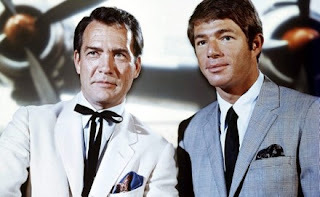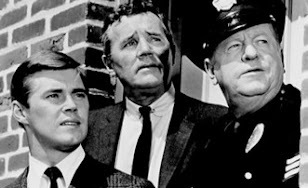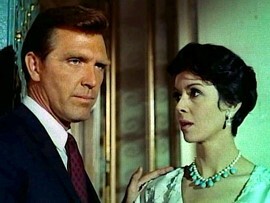Shows I've been watching: April, 2022

Shows I’ve Watched:Shows Next on the List:Judd, for the DefenseSurfside 6The Felony SquadThe Man Who Never WasThe Rat PatrolDanteBlue Light
 Around the Hadley household, Monday nights have been psychiatric drama nights for quite some time, what with Breaking Point, The Eleventh Hour, and The Human Jungle being regular features. (No smart cracks about self-diagnosis.) So, naturally, the only kind of show that will do as a follow-up is a courtroom drama, right?
Around the Hadley household, Monday nights have been psychiatric drama nights for quite some time, what with Breaking Point, The Eleventh Hour, and The Human Jungle being regular features. (No smart cracks about self-diagnosis.) So, naturally, the only kind of show that will do as a follow-up is a courtroom drama, right?Judd, for the Defense was an ABC series running for two seasons, from 1967 to 1969. Now, every courtroom drama inevitably winds up being compared to Perry Mason, and Judd is no exception. Like Mason, Judd involves a high-powered defense attorney; like Mason's, Judd's clients are (usually) accused of murder; like Mason, Judd culminates in a courtroom trial with a fair share of histrionics. And like Perry Mason, Judd, for the Defense is powered by the charismatic performance of the title character.
Clinton Judd, whom the ABC press releases compared to real-life attorneys such as Percy Foreman and F. Lee Bailey, is played by Carl Betz, best-known as Dr. Alex Stone, Donna Reed's husband in The Donna Reed Show. Betz played Dr. Stone for eight seasons and, as more than one critic has pointed out, he must have loved sinking his teeth into a juicy role like this. Judd, like Mason, is driven by a thirst for justice, often resulting in him taking on clients against his better judgment. They're far from identical, though. Whereas Perry relied on his loyal secretary, Della Street, and his trustworthy investigator, Paul Drake, Judd has his young associate, Ben Caldwell, played convincingly by Stephen Young.
 Judd also displays a flamboyance that Mason, for all those accusations of "courtroom theatrics" that Hamilton Burger flings against him, rarely shows. Wearing a string tie and sporting a Stetson, Judd is every bit the Texan he portrays. (His office is, I believe, supposed to be in Houston.) And he's not above pulling some real theatrics; in one episode, just as the prosecutor is about to reach the dramatic peak of his argument, Clint "accidentally" knocks a pitcher of water off the table, interrupting his adversary and causing a delay while everything is mopped up. He was, of course, appropriately apologetic.
Judd also displays a flamboyance that Mason, for all those accusations of "courtroom theatrics" that Hamilton Burger flings against him, rarely shows. Wearing a string tie and sporting a Stetson, Judd is every bit the Texan he portrays. (His office is, I believe, supposed to be in Houston.) And he's not above pulling some real theatrics; in one episode, just as the prosecutor is about to reach the dramatic peak of his argument, Clint "accidentally" knocks a pitcher of water off the table, interrupting his adversary and causing a delay while everything is mopped up. He was, of course, appropriately apologetic. Longtime viewers of Perry Mason know that Mason's cases don't usually get to trial; most of them are solved in the preliminary hearing (thus saving the producers money in having to cast actors as jurors). Things are a little different here, though; Judd does his work in front of the jury, where he forcefully argues his case before the defendant's peers. It's a thrill watching Betz do his thing; he speaks with heat and passion in a way that we seldom get to see Raymond Burr operate, beyond the first season or two. The same goes for the way Judd questions witnesses; he can be sly and subtle, or he can lash out like an angry animal. Either way, you get the point that Clinton Judd is not a man to be messed with.
Another thing about Judd: you can't always assume that his clients are innocent. One of them, in fact, turns out to be guilty, although as the victim of a split personality, he didn't really realize it. It was very cleverly set up and well executed, though, and the reveal came as a genuine surprise, to me at least. And then there was the case of a woman accused of murdering her abusive husband. She's acquitted, but at the end she wonders out loud whether or not she really acted in self-defense, or if she wanted to kill her husband. She's not suggesting that she got away with something; rather, she's expressing a self-doubt that is clearly going to take her years to work through. The point is, you're not nearly as confident that Judd's client will get off, or deserves to get off, as you were with Perry.
It's true that the legal side of things is often a bit dubious, the plots can sometimes be far-fetched, and while the series is admirable in tackling "relevant" issues like abortion, drugs and the draft (not unlike The Defenders), those "with-it" moments can be a little bit painful. the scenes in the courtroom never last quite as long as you want them to. The important thing, though, is that they're entertaining; you won't be bored watching them.
Most of all, Judd is about Carl Betz, who is just terrific. I'm not enough of an expert on Donna Reed to tell whether or not he ever flashed these glimpses of edgy toughness, but watching him, you believe he's a man of integrity, committed to justice, and willing to do whatever it takes to achieve it for his client, even when he's pushing the envelope. You find yourself tuning in to watch Betz, and sticking around for the rest of the show; no wonder he not only won an Emmy for the role, but (like Raymond Burr) frequently spoke before bar associations. I don't want to shortchange Stephen Young, though, who is smart and tough. He's not afraid to stand up to Judd, to challenge or goad him on his strategies, and to rake their client over the coals when it's justified.
And those clients often have it coming. After all, the lesson learned from all these shows—even more than "crime doesn't pay"— is this: never, ever withhold anything from your lawyer. You'd think they'd know better by now.
l l l
Speaking of programming, Thursdays have been cops-and-robbers night here for as long as I can remember (keeping in mind that my memory doesn't work as well as it used to). First, there was a long, long run of Hawaii Five-O (except for the final season, which—let's face it—was really, really bad). After that ended, Thursdays became a rotating series of half-hour dramas, many of which you've read about here: N.Y.P.D., Richard Diamond, Johnny Staccato. Now we've moved on to another pair of 30-minute melodramas featuring good guys and bad guys, but that's where the similarities end.
 The Felony Squad ran on ABC for three seasons, from 1966 to 1968. It lacks the grittiness of, say, N.Y.P.D. or Dragnet, and unlike those series, it always seems to feel as if the ending is rushed, or condensed, to make sure it fits inside the half-hour timeslot. That's not meant as a knock, just an observation. The Felony Squad stars Howard Duff as veteran detective Sam Stone*, Dennis Cole as his partner, young Jim Briggs, and Ben Alexander as desk sergeant Dan Briggs, Jim's father.
The Felony Squad ran on ABC for three seasons, from 1966 to 1968. It lacks the grittiness of, say, N.Y.P.D. or Dragnet, and unlike those series, it always seems to feel as if the ending is rushed, or condensed, to make sure it fits inside the half-hour timeslot. That's not meant as a knock, just an observation. The Felony Squad stars Howard Duff as veteran detective Sam Stone*, Dennis Cole as his partner, young Jim Briggs, and Ben Alexander as desk sergeant Dan Briggs, Jim's father.*I've often wondered if the name "Sam Stone" was an inside joke, since for many years Howard Duff played private detective Sam Spade on the radio.
The stories are run-of-the-mill, nothing special, but usually well-acted, although the first episode, "The Streets Are Paved with Quicksand," is harmed by an unbelievably hammy performance from Darren McGavin as a shyster trying to get Stone and young Briggs nailed on a charge of police brutality. Stone is street-smart, young Briggs is earnest, and elder Briggs shrewd, and protective of his son. (Fun fact: this role prevented Ben Alexander from reuniting with Jack Webb on the reprisal of Dragnet.) I would prefer more, especially more for Duff, but I'm not complaining about what I do have. It clearly falls into the "enjoyable" category, plus it has a no-nonsense theme by Pete Rugolo. And there's a crossover story with Judd, for the Defense!
l l l
Felony Squad teams up with another half-hour drama, The Man Who Never Was, yet another ABC drama which aired for 18 episodes in 1966-67. For all I know, commercials for all three of these shows might have run during the others' shows, but that's kind of beside the point, I suppose. I'll say this right up front: The Man Who Never Was is extremely frustrating to watch. Not because it's a bad show, although it should have been called The Show That Should Have Been Better Than it Was. No, it's frustrating because very little of it exists, at least on YouTube, and most of what does is taken from two theatrical releases that were, in turn, compilations of episodes from the show. What that means, in practical terms, is that of the seven or so episodes that YouTube has, most of them only run about 17 minutes, leaving you with the distinct impression that something is missing.
And that's too bad, because I'd like to give this show a better look. It stars Robert Lansing as Peter Murphy, a CIA agent in East Berlin whose cover is blown in the premiere. On the run from the Stasi, Murphy staggers into a bar where he sees his exact double, playboy Mark Wainwright, who just happens to be one of the richest men in the world. As Murphy watches, an inebriated Wainwright stumbles out of the bar and is promptly gunned down by an agent who mistakes him for Murphy. Well, since they're exact doubles, you could be forgiven for making that kind of mistake, I suppose.
 Murphy assumes Wainwright's identity in order to save his life, but finds that having to pretend to be Wainwright is no bargain. For one thing, he was a bully, a louse, and a ruthless businessman. For another, Wainwright was also married. Fortunately for Murphy, Wainwright's wife Eva is played by the elegant Dana Wynter, who has as much of a motive for keeping the deception alive as Murphy has: half brother Roger is trying to steal the family fortune, something he can't do as long as Wainwright refuses to go along with it. So in turn for helping Eva out, she agrees to help him impersonate her late husband—his mannerisms, his turns of phrase, his relationships with friends and enemies. Despite this, almost every episode features Murphy having to fight (and kill) in order to keep his real identity secret, all while falling in love with his pretend wife.
Murphy assumes Wainwright's identity in order to save his life, but finds that having to pretend to be Wainwright is no bargain. For one thing, he was a bully, a louse, and a ruthless businessman. For another, Wainwright was also married. Fortunately for Murphy, Wainwright's wife Eva is played by the elegant Dana Wynter, who has as much of a motive for keeping the deception alive as Murphy has: half brother Roger is trying to steal the family fortune, something he can't do as long as Wainwright refuses to go along with it. So in turn for helping Eva out, she agrees to help him impersonate her late husband—his mannerisms, his turns of phrase, his relationships with friends and enemies. Despite this, almost every episode features Murphy having to fight (and kill) in order to keep his real identity secret, all while falling in love with his pretend wife.Yes, it is pretty implausible; I mean, I have yet to meet my exact double, although if he's out there, I hope he's enjoying pretending to be me. But in Lansing and Wynter, you have a couple of real pros; ad to that the presence of John Newland (One Step Beyond) as producer and director, and location filming throughout Europe, and you've got the ingredients for a pretty good show. Maybe it's another case of an idea not served well by a 30-minute running time; maybe the laid-back Lansing was a little too laid back (which is what Cleveland Amory thought, although I think an undercover agent would necessarily be restrained in his actions), maybe the audience liked their spies to be more like James Bond. It was up against Green Acres and Chrysler Theatre, which didn't do it any favors. I'd just be happy to see a few more complete episodes. It's a short run, though—stay tuned to see what takes its place next month. TV
Published on May 25, 2022 05:00
No comments have been added yet.
It's About TV!
Insightful commentary on how classic TV shows mirrored and influenced American society, tracing the impact of iconic series on national identity, cultural change, and the challenges we face today.
- Mitchell Hadley's profile
- 5 followers



